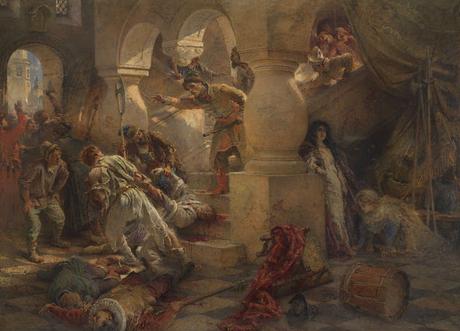by Paul J. Pelkonen

The Murder of the False Dmitry by Konstantin Makovsky
gives some idea of the mayhem to come at this summer's Bard Festival.
Image from Wikimedia Commons.
Bard SummerScape and the Bard Music Festival that follows it are the twin brainchildren of Leon Botstein, president of the university, academic, lecturer, musicologist and conductor of the American Symphony Orchestra and The Orchestra NOW!, two ensembles that are his vehicles for deep dives into the darker regions of 19th and 20th century music. Dr. Botstein is at the helm of both the school and the concerts, which are at the Richard B. Fisher Center, a gorgeous Frank Gehry-designed concert hall that squats in one corner of the verdant campus.
This year, the opera of interest is Dmitrij, an 1892 grand opera by one Antonín Dvorak. It functions as a sort-of sequel to Mussorgsky's Boris Godunov. In Russian history, Boris was the first Tsar in the Time of Troubles, the years that followed the death of Ivan the Terrible. His reign ended when a rebellion marched on Moscow, led by a sort of revenant: an impersonator who claimed to be the son of Ivan, whom everyone (at the time) believed was murdered by Boris. (The Mussorgsky opera follows the Pushkin play, in which Boris is indeed a murderer.)
This "false Dmitry" (as he is known to historians) did not reign long. (In fact, he was the first of three such pretenders, all of whom claimed to be the murdered Tsarevitch and all of whom led attacks on Moscow.) This opera is based on a play by one Ferdinand Mikovec, who himself was inspired by an unfinished play Demetrius by Schiller. It concerns the faction fighting around the Russian court, and the relationship between Dmitrij and Xenia, the obligatory love interest. Like Boris himself, this pretender meets a bad end.
The forces behind Dmitri/Dmitrij's rise to power were (as is depicted in both Dvorak's opera and Boris Godunov) intriguers from Poland. That country's most famous composer is the subject of Chopin and His World, a three-week August celebration of that legendary figure. Chopin does not have a big catalogue, but Bard will offer programs of his music, an exploration of Jewish composers like Mendelssohn and Alkan, and a series of intense piano recitals.
There is as always, opera on the program too, with a performance of Act III of Rossini's Otello scheduled for August 12, paired with arias by Meyerbeer, Spohr and Weber, worthy composers whose work was drowned in the tide of Wagnerism that flooded the late 19th century. Another program, "Virtuosity!" offers an exploration of Chopin in context with flashy musicians like Liszt and Paganini who may have lacked his restraint but are nonetheless important in music history.
The Festival ends August 20th with Berlioz, that titan of the 19th century who overcame the enmity of most of Paris to emerge as one of the most significant composers of his day. The big work on the program: the composer's third and final symphony, an exhaustive symphonic retelling of Romeo and Juliet for grand orchestra and chorus. It will be a fitting end to this fascinating annual festival, which educates listeners even as it entertains.
Bard is reachable by driving to Annandale-on-Hudson, taking MetroNorth from the city or arranging for seats on the Bard shuttlebus which leaves early in the morning from Lincoln Center for select concerts and operas. More information is available on the Fisher Center website.

